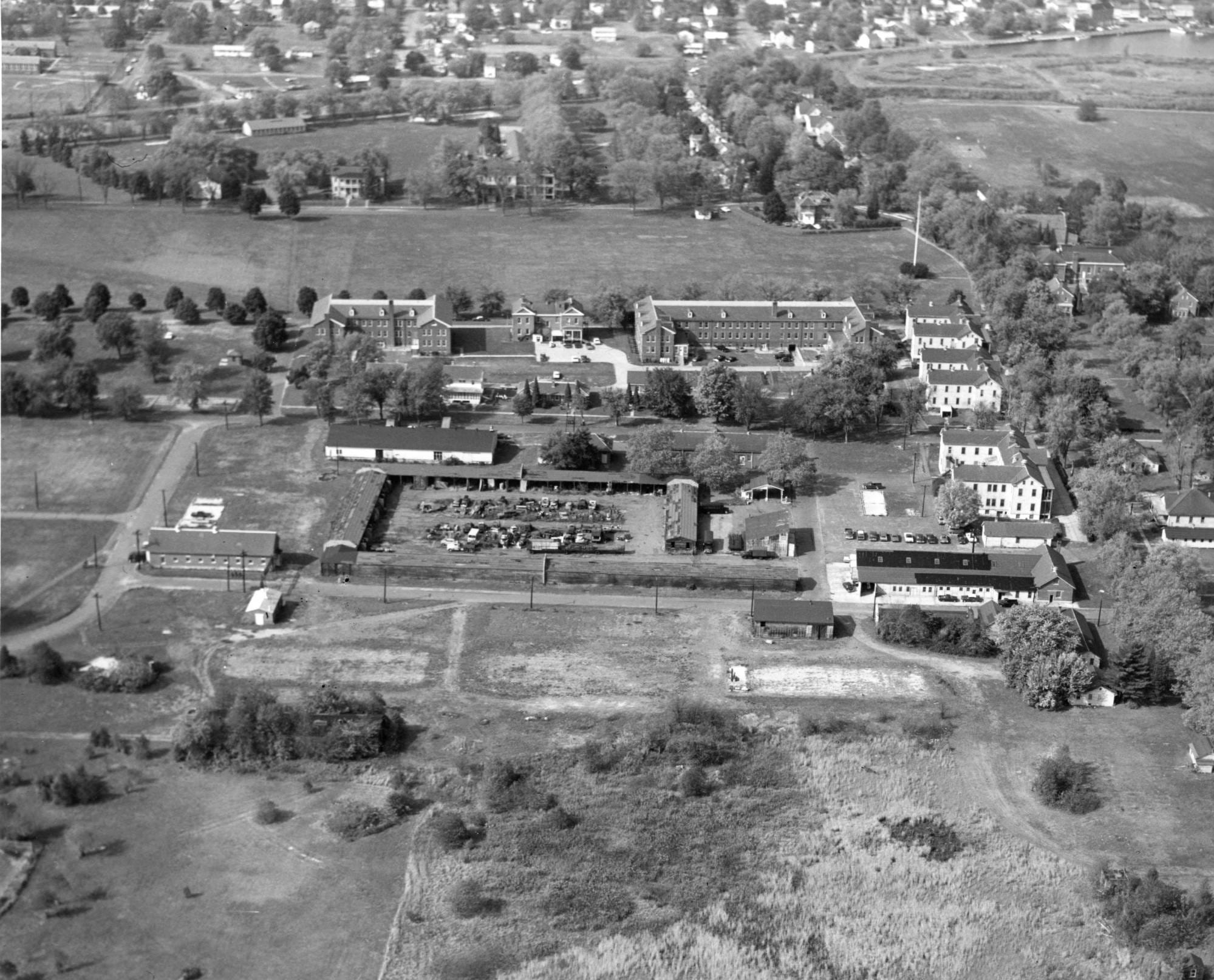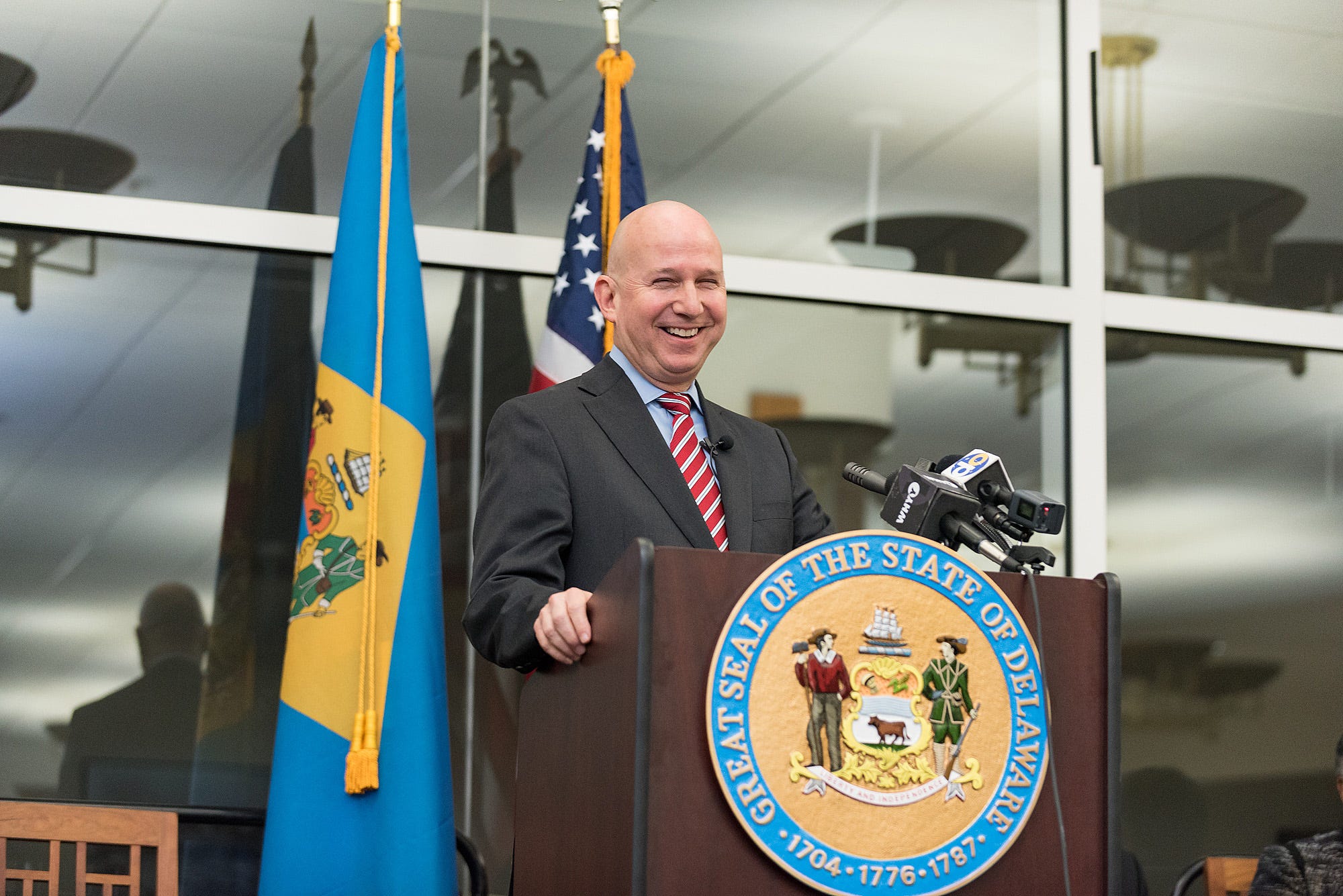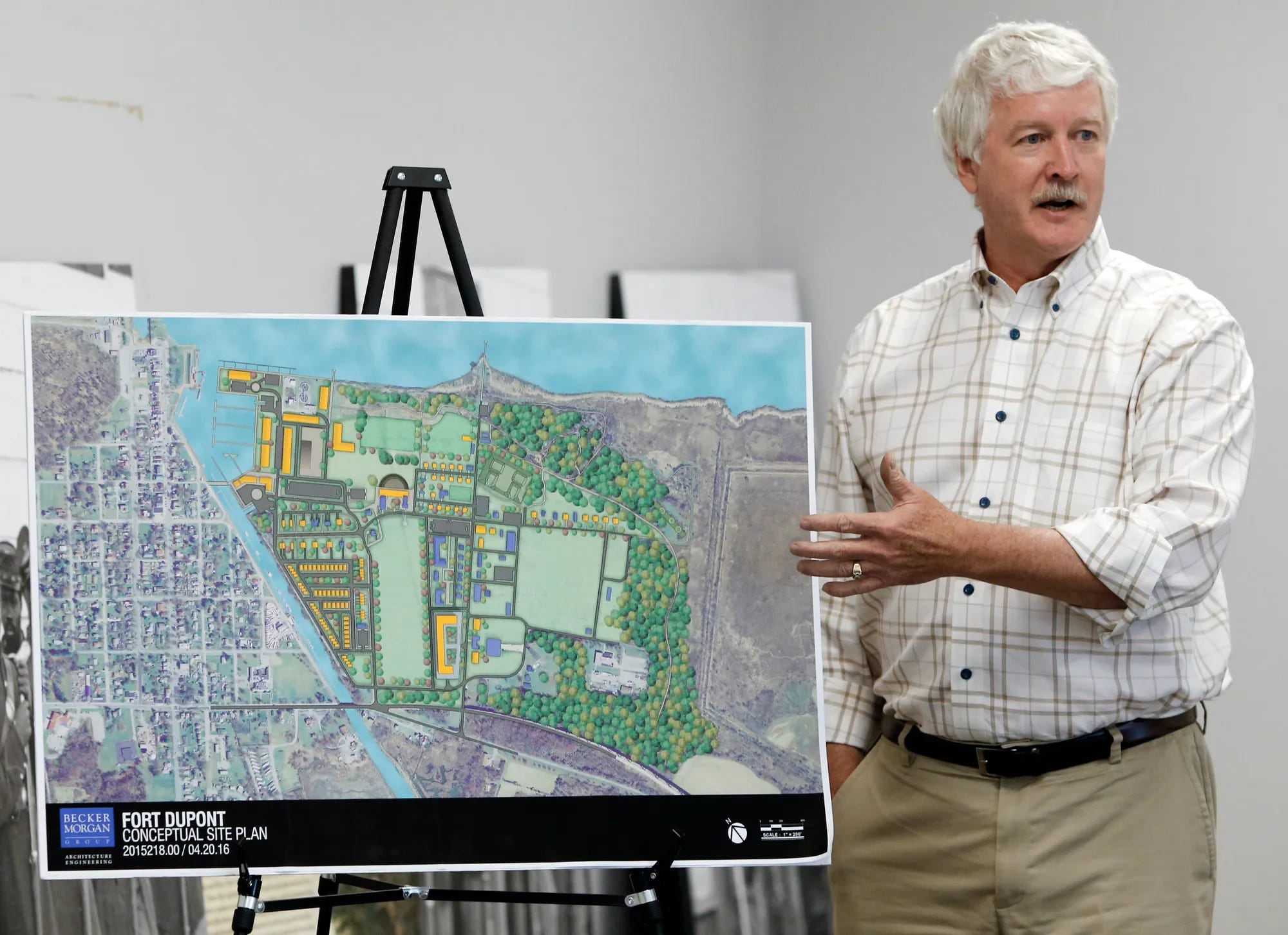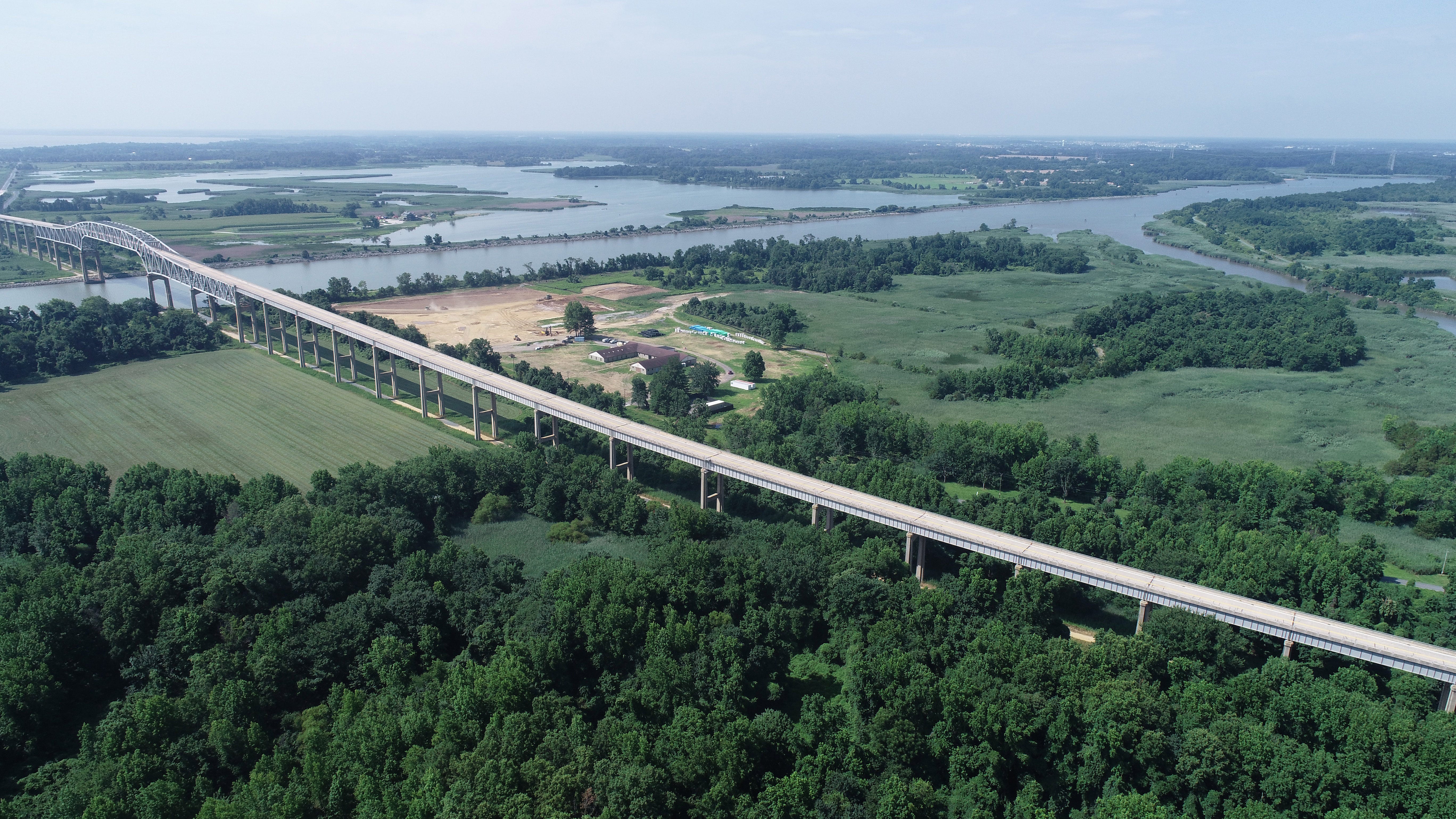About a decade ago, state leaders decided a little-known former military fort neighboring Delaware City would be an ideal location for the state’s next “vibrant, mixed-use community.”
Largely abandoned after World War II, much of Fort DuPont had fallen into disrepair entering the 21st century. Located at the corner of the Chesapeake and Delaware Canal and Delaware River, Gov. Jack Markell thought the fort could be reimagined with new homes, a marina, a hotel and shops.
Video: How the Fort DuPont project went wrong
A plan to bring a mixed-use community to Delaware sparks controversy among local residents.
Damian Giletto, Delaware News Journal
In 2014, the state formed the Fort DuPont Redevelopment and Preservation Corporation to build out the site and attract developers. The state turned over more than 300 acres of land to the corporation and began committing millions each year to fuel the development.
But in the last few years, the ambitious project has veered off course, causing a stir in Delaware City, the departure of the project’s first leader and a recent reset of its aims and processes.
The corporation is now in its first full year with its second executive director, former director of the Division of Historical and Cultural Affairs Tim Slavin, at the helm. Here’s how the project has unfolded so far.
Unfulfilled promises:How Delaware’s plan to resurrect Fort DuPont as a ‘vibrant’ riverfront haven went wrong
The government purchases land on the Delaware River near Delaware City and begins to build a 10-gun battery that is expanded over the next few decades. Its location at a bend in the Delaware River is considered well suited for protecting Philadelphia and other northern cities.
Fort DuPont is named for Rear Adm. Samuel Francis du Pont, a Civil War hero.
Delaware Public Archives
Fort DuPont is expanded during World War II. With advances in aircraft technology turning sea coast forts obsolete, its focus turns to training. At this time, Fort DuPont and Delaware City are rife with military life existing as almost one and the same.
Fort DuPont is used as a German prisoners of war camp.
After the war, Fort DuPont is considered surplus and is given to the state. A year later, the state opens the Governor Bacon Health Center, a mental institution for “socially and emotionally disturbed” children.

Delaware Public Archives
The property is designated as Fort DuPont State Park.
The state uses $860,000 in open space funding to buy 139 acres opposite the Reedy Point Bridge from Fort DuPont. The property is known as Grassdale. Delaware code states land acquired with open space funding “shall remain in public outdoor recreation and conservation use in perpetuity.”
Then state treasurer Jack Markell begins discussions with DNREC about redeveloping Fort DuPont, according to News Journal archives.

File photo
Markell, now governor, signs a bill that creates the Fort DuPont Redevelopment and Preservation Corporation, “an entity that will spearhead the renovation, redevelopment and preservation” of Fort DuPont.
The Fort DuPont Redevelopment and Preservation Corporation holds its first board of directors meeting. Susan Frank, a former executive director of the Delaware State Housing Authority, is the chair of the board and is leading the search for the project’s first executive director. The director will carry out the corporation’s day-to-day functions and report to the board.
Jeff Randol is introduced as the first executive director of the fort corporation. Randol has no prior experience working in Delaware. At the time, he operated a fresh foods grocery store he co-founded in Missouri.

William Bretzger/The News Journal
The state completes the transfer of Fort DuPont and Grassdale to the corporation. The legislation that formed the corporation says it can sell or develop any property comprising the Fort DuPont Complex or transferred to the Corporation.
Delaware City residents vote to annex the Fort DuPont property into Delaware City.
The corporation signs an agreement with Rockwell Development Group for the construction of Fort DuPont’s first homes in what would be known as the Canal District along the Branch Canal.
Jerry Habraken, Delaware News Journal
After the corporation spent almost $700,000 to renovate a stately historic Fort DuPont house, it agrees to lease it to Randol and his wife for $2,000 a month.
Randol and Blue Water Development sign a letter of intent for the sale of Grassdale property for an RV park and campground.
The board of directors discuss the Grassdale sale publicly for the first time. Randol said he was not aware of anything prohibiting the sale and asks the corporation’s general counsel to research it.

Tom Costello & Mike Davis/The Asbury Park Press
The board approves the Blue Water RV park and campground proposal sale agreement subject to a number of conditions.
The corporation’s general counsel sends a memo to the board that shows he and the board were unaware the state purchased the Grassdale property with open space funds. He tells the board the land protections don’t apply to the corporation because of the enabling legislation and asks the board to keep the memo confidential.
The corporation and Blue Water sign an indemnification agreement that protects Blue Water against potential challenges to the sale and development of the Grassdale property.
The Blue Water deal closes for $3.6 million, including an interest free $2.1 million mortgage for five years.
Randol resigns as executive director effective March 31. He later tells Delaware Online/The News Journal, “If I had not pushed through the sale of the Grassdale property, I’d probably still be working there.”
Jerry Habraken, Delaware News Journal
An emergency meeting is held about road improvements required at the entrance to Fort DuPont before further building can proceed. A roundabout has been approved, but they are questions about its safety. The corporation has spent much of the previous few years attempting to secure funding for construction of the roundabout.
State Sen. Nicole Poore and Rep. Valerie Longhurst write a letter to the board of directors urging them to terminate their lease agreement with Randol and sell the house to recoup some of the corporation’s investment. They say the board should stop leasing property to employees. “The conflict of interest, actual or perceived, is simply too glaring to reconcile,” they write.
As community opposition mounts, Poore and Longhurst issue a statement on the Grassdale sale, saying they had “reservations about the plans for that property.”
Sarah Gamard
Blue Water site work begins on the RV Park.
Blue Water stops site work at Grassdale, saying it’s reshuffling project timelines and will resume work in 2024.
Legislation sponsored by Poore and Longhurst that changes the composition of the board of directors is signed into law. It states that the corporation is not exempt from environmental law and regulatory requirements, must show greater diligence in hiring and contracting and submit regular reports to the governor and General Assembly.
Suchat Pederson, The News Journal
Tim Slavin, the director of the Division of Historical and Cultural Affairs, begins his tenure as executive director.
The Delaware City Planning Commission gives a favorable recommendation for a special-use permit for the Marina Village project. The project calls for 130 townhomes between the existing Fort DuPont residential development and the Delaware River.
After considering several alternatives, the corporation announces plans for a roundabout to resolve traffic issues at the entrance to Fort DuPont.
Route 9 from Polktown to Reedy Point roads is closed for construction of the roundabout. It’s scheduled to be closed through March 20, according to DelDOT.
Contact Brandon Holveck at bholveck@delawareonline.com. Follow him on Twitter @holveck_brandon.
Published
Updated